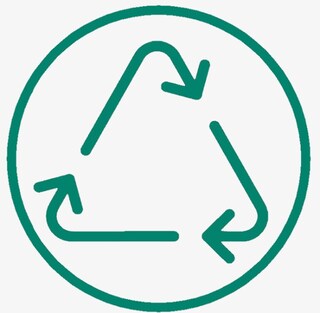
Our 2025 Roadmap goals
see our full 2025 roadmapREDUCE POST-CONSUMER WASTE
Reduce post-consumer waste and prevent littering by implementing comprehensive programs covering all our consumables.
Follow eco-design and circularity principles for all smoke-free electronic devices.
Key performance indicators to track our progress
We significantly expanded anti-littering programs for cigarette butts to cover 92 percent of sales volumes in 2024. End-of-life take-back programs for smoke-free consumables covered 21.5 percent of sales volumes by year-end, progressing slower than expected in high-volume markets.*
* Shipment volume includes heated tobacco units, e-vapor cartridges, and disposable vaping devices. See PMI’s Sustainability KPI Protocol 2024 for further details.

See full performance metrics
view dataLearn more about PMI’s Sustainability Index in our Integrated Report 2024. See the full performance metrics and related footnotes here.
The right thing to do
Reducing and appropriately managing post-consumer waste means we extract, convert, and use fewer raw materials from a planet with limited natural resources.
Read moreThe business case
Many consumers consider the environmental impact of products and services in their purchase decisions.
Read more
Our progress in 2024
Read more in our Integrated ReportWorking with behavioral scientists to change attitudes toward littering
Piano music starts
Pia Prestmo’s voiceover starts:
We decided to go with mind shift because
there are well-renowned scientists,
behavioral scientists that have worked
Pia Prestmo, Manager External Affairs at Philip Morris Norway, talks to camera:
...on litter before and they've done
research on behalf of both the authorities
and other private companies.
Jørgen Dalen, Behavioral Scientist at Mindshift, speaks to camera:
The benefits of our cooperation with the
PMI is that they give us a chance to conduct
experiments so we are pretty sure about
the real effects of these measures.
The experiments work really well,
Especially the footsteps on the ground.
I think it's the most effective measure we have ever
seen on littering
You always have to think about
motivation and what drives people in
order to make a proper behavior design.
Ida Kopperstad, Behavioral Scientist at Mindshift, speaks to camera:
Our techniques are based on research and
studies about human behavior and how to
trigger the right behavior at the right time.
Pia Prestmo, Manager External Affairs at Philip Morris Norway, talks to camera:
Well I think ballot bins are pretty well
known all over Europe and in Oslo, we
have them you know in every street corner.
but I just wanted to look into
how can you have smokers use them even
more to make them more a part of their everyday?
Jørgen Dalen, Behavioral Scientist at Mindshift, speaks to camera:
I think we now have the knowledge on how
to reduce the litter so now it's pretty
much up to the stakeholders to
to make these measures go through.
Pia Prestmo, Manager External Affairs at Philip Morris Norway, talks to camera:
I think that nobody can do this alone.
I think all good forces need to be joined
I'm talking about the authorities,
private companies, civil society,
we all need to do our part and we need to speak
together and you know align in order to
to have the good results that we all want to have.
When we started this project I did
expect nudging to have an effect,
but not such a great effect.
I was astonished.”
Words on screen read:
Mindshift study results: 145% usage increase with nudging and prompts about the bins’ purpose.
20% bin usage increase when adding further messages to capture attention.
Philip Morris International logo is seen on screen.
Music ends
PMI collaborates with Cortexia to analyze litter
Music starts
Voiceover begins
At PMI, we know the importance of working with experts in order to grow in a
more sustainable and responsible way. And this is why we are always looking for companions
to better understand and meet the challenges ahead. In 2017, we started working with Cortexia
to analyze litter, how much there is, of which type, and the measures that most efficiently
reduce litter. Cortexia is a project that combines artificial intelligence
and sustainability. Our technology allows us to monitor the streets and quantify litter
in real time.
Andréas von Kaenel, CEO of Cortexia, speaks to camera:
We help the city to improve the efficiency on cleaning resources,
including special emphasis on cigarette butts.
Voiceover speaks:
This new technology helps to
understand an old problem by showing which waste is littered where and when.
Andréas von Kaenel, CEO of Cortexia, voiceover speaks:
Partnering with PMI was a qualitative leap for us to develop certain technologies that allow us
to move towards a clean and sustainable future, not only in cities but also in seas and beaches.
Jens Rupp, Manager of Environmental Sustainability, Philip Morris International, speaks to camera:
We are aware that we can play a crucial role in changing people's habits.
We want to be the one to promote that change. We must be.
Andréas von Kaenel, CEO of Cortexia, voiceover speaks:
Many cities have already used our technology to improve their litter rejection programs.
By being more effective in reducing cigarette butts here,
we will avoid pollution there.
Cortexia offers us the possibility to quantify an anti-littering campaign success by evaluating
whether cigarette butt littering is reduced as a result of specific actions and by how much.
Jens Rupp, Manager of Environmental Sustainability, Philip Morris International, speaks to camera:
These insights are incredibly useful for us.
Andréas von Kaenel, CEO of Cortexia, speaks to camera:
Together we have developed new tools which allows us to move forward.
We even use drones to measure litter.
Voiceover speaks:
Every new partnership helps our efforts and increases our effectiveness to protect the environment.
Logos appear on screen for Philip Morris Internation and Cortexia.
The words: Working together appears alongside them.
Music ends.
PMI and Litterati: Working together
Instrumental music starts
Voiceover starts:
Litterati is an organization dedicated to
the prevention of litter we use
Jeff Kirschner, Founder and CEO of Litterati, speaks to camera:
...technology to engage people and then use
the collected data to drive smarter
litter prevention strategies.
Dick Ayres, Cofounder and Chief Strategy Officer at Litterati, speaks to camera:
We started taking a photograph on Instagram and now
we've developed a platform which
connects people allows us to analyze
data and to uncover insights and patterns.
Jeff Kirschner, Founder and CEO of Litterati, speaks to camera:
The type of litter item as well
as where and when it's picked up are all
recorded for analysis.
Jens Rupp, Head of Environmental Sustainability at Philip Morris International, speaks to camera:
Litterati is one of the world's leading
experts and actors on anti-littering.
Jeff Kirschner, Founder and CEO of Litterati, speaks to camera:
We can empower people with the tools to be part of the solution.
Voiceover speaks:
The data is taken from the application
so just by taking a photograph we can
extract from that photograph the bottles,
the cans, the cigarette butts, that are in it,
they're geo-located.
We can understand
concentrations we can understand where
hot spots are.
Jeff Kirschner, Founder and CEO of Litterati, speaks to camera:
From identifying every cigarette butt or
piece of plastic on a city street to
locating illegal dog sites.
Voiceover continues:
and understanding that helps us find solutions to
how this littering can be reduced over time.
Jens Rupp, Head of Environmental Sustainability at Philip Morris International, speaks to camera:
they have a fantastic consumer-facing
app an application that can be used to
generate engagement and they also have
presence in many countries.
So working together allows us
to reach more people, to engage more
people than we could ever have dreamt of otherwise.
We're working with Litterati and also Carto,
one of the world's leading geo-analysts to develop a little
monitoring baseline in all the countries
where we operate.
This in turn will allow us to define
better programs,
more effective programs to change
behavior across the world.
Jeff Kirschner, Founder and CEO of Litterati, speaks to camera:
We can be a data driven decision tool
for every city in the world,
engaging a global community to be part
of the solution.
Jens Rupp, Head of Environmental Sustainability at Philip Morris International, speaks to camera:
We have a 2025 target to reduce by 50 percent
the plastic litter from our product,
this is an immensely ambitious target.
Jeff Kirschner, Founder and CEO of Litterati, speaks to camera:
I'm an optimist. I believe that in 10 years
we will be fast approaching the true end to litter.
Words appear on screen reading:
Philip Morris International, Litterati, Working together.
Music ends.
This online content about our Integrated Report should be read in conjunction with PMI’s Integrated Report 2024. This report includes metrics that are subject to uncertainties due to inherent limitations in the nature and methods for data collection and measurement. The precision of different collection and measurement techniques may also vary. This report includes data or information obtained from external sources or third parties. Unless otherwise indicated, the data contained herein cover our operations worldwide for the full calendar year 2024 or reflect the status as of December 31, 2024. Where not specified, data comes from PMI financials, nonfinancials, or estimates.
Unless explicitly stated, the data, information, and aspirations in this report do not incorporate PMI’s wellness and healthcare business, Aspeya. Regarding the Swedish Match acquisition, completed late 2022, unless otherwise indicated, this report includes information pertaining to its sustainability performance. Please also refer to "This report at a glance" on page 2 of the PMI’s Integrated Report 2024 for more information. Aspirational targets and goals do not constitute financial projections, and achievement of future results is subject to risks, uncertainties and inaccurate assumptions, as outlined in our forward-looking and cautionary statements on page 206. In PMI’s Integrated Report 2024 and in related communications, the terms “materiality,” “material,” and similar terms are defined in the referenced sustainability standards and are not meant to correspond to the concept of materiality under the U.S. securities laws and/or disclosures required by the U.S. Securities and Exchange Commission.





